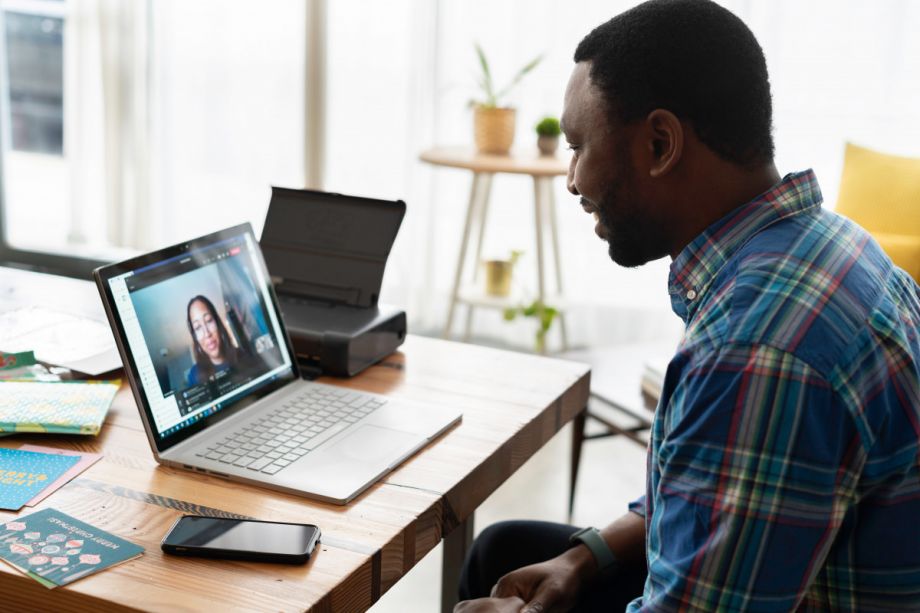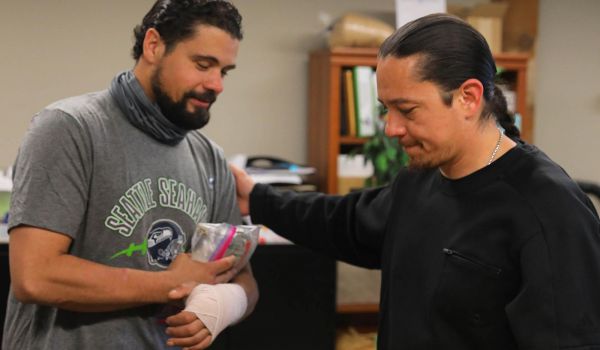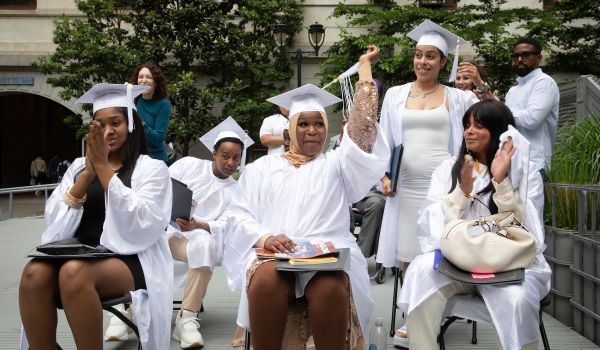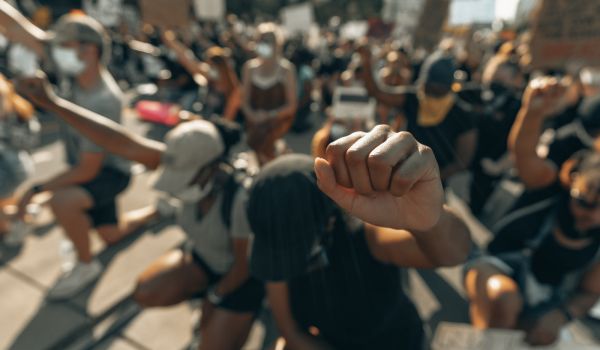When the pandemic struck in early 2020, many people getting out of prison were left struggling as many of the organizations typically available to assist in re-entry, like career centers and Goodwill, were closed due to shutdowns.
“So many men and women were being released in the middle of a crisis with no food, job, or housing,” says Alan Cohen, an entrepreneur who volunteers at correctional institutions in Florida. “We needed a way to network with the formerly incarcerated and provide them with resources.”
In response to the growing problem, Cohen joined with volunteers Michael Junkroski, pastor of the Current Spiritual Community, and his wife Trudy Junkroski, a restorative justice specialist, to support returning citizens.
Their nonprofit organization Re-Entry 2.0 – as known as R2 – is a cohort of volunteers, ex-offenders, nonprofits, guest speakers and family members who meet via Zoom once a week. The group supports newly released prisoners in the transition from prison to life outside, working to solve issues ranging from learning new technology to job placement to finding a food bank.
“People were serving their time and then getting out with little or no options,” Cohen says. “So we created a virtual room where everyone could come to talk about their needs or just connect with other people.”
With the world socially distanced from one another, meeting virtually gave R2 an advantage over the traditional resource centers. The Zoom meetings allowed busy people to safely convene without leaving their homes.
The program quickly expanded beyond Florida to include formerly incarcerated people and guests from California, New York, Texas, Pennsylvania and New Jersey. It’s even gone global, with participants from South America and Scotland.
“It’s natural for us to want to welcome people back into society,” Trudy says. “It doesn’t matter where you live, we want to celebrate your success and help you reintegrate.”
A Way to Connect
Initially, R2 offered tangible resources like clothes, a Chromebook or a bus pass. Eventually the group began providing counseling and evolved into a close-knit community of people touched by the justice system. It was no longer just the transition hub Cohen had envisioned.
“At first it was a way to find re-entry support during COVID,” Michael says. “But eventually it became a space to check in and stay connected. It seemed like that’s what people needed most.”
Finding housing and a job remain major concerns for individuals leaving prison, but less attention is given to developing positive social connections after returning to the outside. By creating a program with a community of ex-offenders that are stakeholders in each other’s success, R2 has helped fill that void for participants.
“At some meetings there’s a lot of laughing and fun, but we also hurt for those struggling to adjust,” Trudy says. “We share in the humanity of helping others on their journey.”
While state programs and other organizations exist to give incarcerated individuals limited assistance with their re-entry, the cooperative spirit R2 provides is rare. The Zoom meetings are an anomaly in Department of Corrections transition circles, and the group doesn’t receive financial help from government agencies.
In addition to attending the weekly meet-up, ex-offenders are encouraged to give back to their communities through service, often getting involved in local outreach programs or finding opportunities to volunteer. Some assist elderly neighbors, start ministries, or visit local jails and prisons. Others mentor kids in the Boys and Girls Club or clean local parks.
William Steele, an R2 member who was paroled from prison in 2020, says he finds satisfaction in helping others. “Several of us spent the last year mentoring kids from a teen court program,” he says. “We also assist family and friends of the incarcerated who are dealing with issues related to re-entry.”
Signs of Progress
According to a report by Prison Policy Initiative, roughly 600,000 Americans are released from jails and prisons every year, many of whom do not have an emotional support system in place for when they get out.
Donations of clothing and groceries are helpful. But having a friend or mentor to guide you through a difficult transition is important for a successful re-entry.
“Re-entry 2.0 gave me a forum to express myself,” says Jeff Reuter, 52, a recently returning citizen who spent 28 years in prison before being paroled and joining the group. “During my first few weeks out, I felt more comfortable around others who’d shared my prison experience and understood the problems I faced in transitioning.”
Instead of giving an ex-offender a bag of groceries and sending them away, or setting up a job interview only to never see them again, the R2 community provides moral support, connection and ongoing assistance that helps individuals transition in the long term.
“It really does matter knowing that people care about me and my success and are willing to listen,” Reuter says. “That helps me do better.”
In addition to networking, R2 also helps stem a long-standing trend of post-prison unemployment. A 2022 report by the Bureau of Justice Statistics shows that up to two-thirds of formerly incarcerated people are jobless within four years of release. Yet almost everyone in the R2 cohort is working or owns their own business.
Transitional services have long been an afterthought for the Florida Department of Corrections, often choosing instead to let outside organizations and charities carry the burden, advocates for the formerly incarcerated say. With at least 21% of people coming back to prison within the first three years of release, according to a 2022 Florida Prison Recidivism Report, the state should put more effort into aftercare.
Few correctional officials are interested in providing the social network that R2 does, with professionals and returning citizens meeting weekly via Zoom to discuss real problems in real time.
Arrest rates remain low for the group’s formerly incarcerated participants: Only a handful of members have re-offended, much less than the 60% average for ex-offenders reported by the Florida Department of Corrections’ Office of Strategic Initiatives. The few who did get arrested were for minor violations of probation, technical issues like a missed curfew or failed drug test, R2 organizers say.
Cohen attributes this success to group accountability and positive peer pressure.
“The evidence is clear that our members are more successful upon re-entry than the state average,” he says. “More proof that the justice system is broken.”
Facing Limitations
In many European countries, prisoners are given a pre-release conference to identify what resources are needed upon re-entry including therapy and social skills classes in order to become a law-abiding citizen.
In Hungary and Norway, officials hold that future crime prevention begins with the successful reintegration into society, and they focus on a plan to go back into the community. A typical releasee is given aftercare counseling and team building training, combined with traditional transition services, in order to help keep them out of prison.
Advocates say many of the same strategies could be used by the American criminal justice system, but the institutions charged with imprisoning people must become part of the re-entry process. In the meantime, while programs like Re-entry 2.0 step in to fill the needs of returning citizens, there are limits to what a private organization can do.
“Right now there’s a housing crisis for formerly incarcerated people,” says Michael. “When someone gets out of prison, chances are they could be homeless. We’re passionate about helping them find a place to live, but there’s no affordable housing.”
Bed space at shelters and halfway houses are limited and in high demand, putting people in a difficult position. Having paid their debt to society, the consequences seemingly continue on indefinitely.
With help from R2 partners – like Florida Cares Charity and Blessings Flow Center for Achievement, a nonprofit specializing in incarceration issues – members of the group are receiving more assistance than ever before.
“We’re now building relationships with the loved ones and families of the incarcerated,” says Shariene Hampton, who works with Blessings Flow Center for Achievement. “That connection helps foster a broader support network for when people get close to re-entry.”
As R2 seeks to prove that a more effective system can benefit returning citizens and lower recidivism, it hopes to draw public funds in order to provide a new laptop to every future member, create an app to provide correctional institutions with links to critical services for incarcerated individuals being released, and possibly open a new transition center.
“The wheels of change move slowly on some of the pressing issues in our communities, like the lack of re-entry services for people coming home from prison,” Trudy says. “We need action and reform. Grassroots efforts demonstrate the how and why of doing things differently, which can in turn, influence policy.”
Ryan M. Moser is a formerly incarcerated journalist from Philadelphia. Nominated for a 2020 Pushcart Prize and Best of the Net 2021, he’s had work published by the Mississippi Quarterly, Upstreet Literary Magazine, Muse Literary Journal, Evening Street Press, Storyteller, Santa Fe Literary Review, Miami Herald, The Covid Collection, University of Iowa Prison Project, Progressive and other publications. Ryan enjoys yoga, martial arts and chess, and has two beautiful boys.









_600_350_80_s_c1.jpg)






